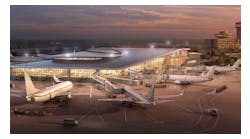Budapest Airport Maps Out New China Growth Strategy
Budapest Airport (BUD) has unveiled an ambitious new growth strategy for Asia that is to launch in the new year, and includes additional direct freighter and belly cargo routes to China as well as enhanced e-commerce capabilities at the Hungarian hub.
The plans align with the airport’s ongoing BUD20:20 expansion programme, which includes the €32.6 Cargo City development scheduled to open next year, and come after BUD recently added new freighter operations from both AirBridgeCargo and Silk Way West Airlines.
To drive the vision forwards, a delegation from BUD recently attended the 15th China Air Cargo Summit in Shanghai where they, along with support from the Consulate General of Hungary in Shanghai, met with Chinese e-commerce companies, and China-based and international carriers.
“China plays a major part in our BUD:2020 growth programme, and we are working together with some of the country’s largest logistics and transport companies to meet rising demand for imports from China,” said René Droese, Executive Director Property and Cargo, Budapest Airport.
“The new freighter routes launched this year complement our existing direct and indirect scheduled freighter and belly cargo connections with China operated by Air China, Cargolux, Emirates, Qatar Airways Cargo, and Turkish Cargo.
“The forwarder community in our region is seeking new ways to reach the Asia market; in addition to this we are witnessing an increasing demand from Chinese e-commerce companies for new, efficient distribution hubs in Eastern Europe, which amounts to a unique opportunity for us.”
He added e-commerce is a “major driver of growth in the air cargo market, particularly in Hungary where we are seeing more than 25 percent growth rate per year, which is one of the reasons Budapest is one of the fastest growing cargo airports in Europe”.
“Eastern Europe represented a significant €73 billion of the e-commerce market in 2017, all of which represents a growing opportunity for BUD,” said Droese.
“The electronics and automotive business is booming in our region, and more Chinese investment was announced recently regarding these sectors.
“Our new Cargo City project under construction with total investment value of about €50 million will provide fast and highly efficient logistic solutions for all business-to-business, business-to-consumer, and consumer-to-consumer markets.”
The new, additional China routes from BUD are expected to take off next summer and some of the e-commerce companies the airport is currently in discussion with include Alibaba Group, SF, ZTO, and STO Express.
”We are witnessing historic moments in China; it was precisely 40 years ago that the Chinese Central Government, led by Deng Xiaoping, introduced the policy of opening the economy to foreign direct investment,” said Szilárd Bolla, the Consul General of Hungary in Shanghai.
“Now, the government of Xi Jinping would like to call the attention of global players to the dynamically growing Chinese internal market.
“The quality of current diplomatic relations between the two countries and this momentum create an excellent opportunity for Hungarian businesses to enter the market.”
Budapest Airport plans to become Central Eastern Europe’s largest cargo hub with the support of €160 million investment and development programme, BUD:2020.
As part of the programme, construction of a new dedicated freight centre, Cargo City began this September, and will centralise cargo operations, expanding the airport’s handling capacity.
BUD’s strategic location places it within a three to eight-hour drive from Central and East European capitals.
BUD has seen year on year growth in air cargo traffic, with annual records consistently being broken.
In the period between October 2017 and 2018 the volume of trucked and flown freight increased by 22.9 percent compared to the previous year.
From 2015 to 2018, the cargo volumes of the airport increased by more than 60 percent.


